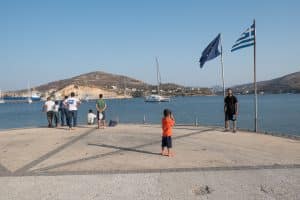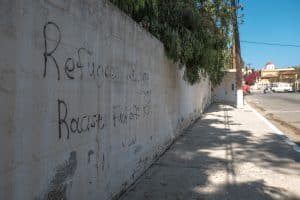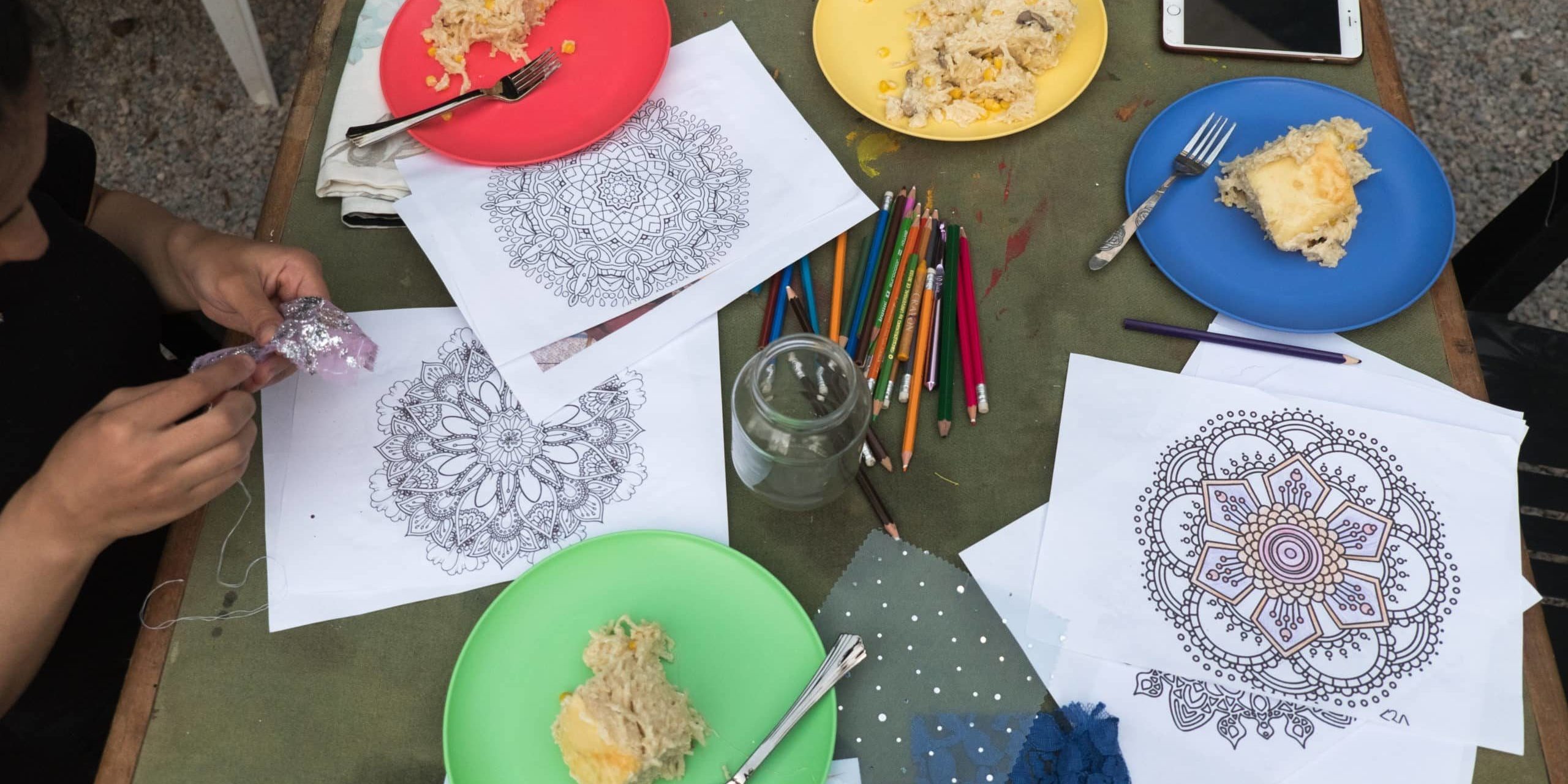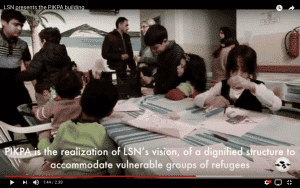The EU-Turkey-Deal crumbles: More and more refugees reach Greece via the Mediterranean again. The inhabitants of a small island at Europe’s borders show the world what it takes to turn a “crisis” in something positive.
By Bob Jones
Leros – a sleepy little island. Abandoned buildings around the harbor give the impression of a ghost town. Unlike on most of the surrounding islands, no tourist buzz at the port. A few kilometres away from the harbor, we find the local refugee camp where we are meeting Nicos Phocas. He has been supporting the various local refugee organisations for many years. “The situation here is much better than on the other islands at this stage, with regard to the camp’s capacities and sanitary facilities.”
Up to 1000 people can be accommodated in the containers that have been set up in response to large numbers of new arrivals in 2016. With only 700 people living here at the moment the camp is below capacity. But this could change anytime: day after day, more boats arrive on the Greek islands. “Many of the refugees who arrive here have had a very difficult passage via the uninhabited island of Farmakonisi. Some of them didn’t have access to water, food and shelter – for up to 10 days.”

© Bob Jones
The Greek authorities chose to locate the local refugee camp in the direct neighbourhood of a psychiatric clinic that until the late 1980s detained people with mental illnesses from all over the country in abhorrent conditions. Nowadays, only few patients are left in the clinic. “This creates a difficult situation for both – those who have been here for long and those who just arrive.” says Nicos. “It would have made sense to rebuild all the abandoned houses of Portolago instead of setting up these containers.”
His partners from Leros Solidarity, a local NGO, have been campaigning for years to achieve exactly that. Now their relentless work bears fruits. The founder of the organization, Martina, is standing in front of a large building in the middle of Leros’ capital Portolago. The property houses a self-organized welcome centre and has recently become the home of particularly vulnerable families. Large rooms provide a minimum of privacy for the families whose sleeping spaces are separated from each other by colorful sheets. “We asked to repair this house for this purpose, and we asked the municipalities for water and gas which was not easy.” Marina recalls. By now, about 60 people live in the house. Just around the corner, we find the community centre of the Austrian NGO ECHO100PLUS, where volunteers from around the world provide language and pottery courses, give swimming classes and organize a Women’s Day.
The government as well as a majority of the islanders are aware of the benefits that the refugees can bring to the island. This awareness was the basis for the development of a far-reaching cooperation structure that includes the schooling and health system. After consultation with the camp doctors, people with health issues are transferred to the local hospital. “All of a sudden, we needed translators. NGOs were hired to help out. By now there are vocabulary lists in every examination room for the doctors to refer to”, a hospital attache tells us over a cup of coffee.

© Bob Jones
Together with Café owner Joanna she remembers the beginning of the so-called ‘Summer of Migration’ 2015: “There were people everywhere! They didn’t have a home or a bathroom” Joanna recalls. “We were one of the very few local businesses that helped. We were working in shifts to provide sanitary facilities for the people. They were lining up for their showers, and after that we closed the Café for a couple of hours to clean and open up again.” Not all of the locals were approving of this. “There were threats against us by some of the locals”. Like on the other islands, activists and refugees on Leros have been attacked by right-wing extremists in the past. “There certainly have been incidents. Last year, for example, two transgender women have been harassed. It was particularly difficult to find a safe space for them. Right now, the situation seems under control.” Nicos summarizes.
In 2017, 14 refugee children are to join the primary school for the first time. In the following year 100 others may follow. “This is an essential step towards integration. We would like to establish a‘normal’ everyday life for the children”. The selection of students is based on the school’s capacity and the children’s language skills. The kids have to pass a language test. Yet, the start of the programme has been delayed. “They could come anytime. We are just awaiting the ‘Go’ by the authorities”, explains Sofia Zervos, director of the primary school. There are issues with vaccinations and some other regulations. “Our teachers have been prepared for the new task. But we are short on equipment. The quality of our education now depends on donations. We need financial support to cope with the situation and be able to care for all the children”.
Fanar, who has come to the Women’s Day at the ECHO100 centre, shares the same wish for her young son: “I just want him to have a good life and education”. The trained journalist had to leave behind her archive in Syria. “Right now, my mind is occupied. But one day, I want to write again, and be creative”. After a short pause she adds with a wink: “And forget about the horrible food in the camp”.
More info #MonitoringDirtyDeals
Sea-Watch in the Agean Sea: sea-watch.org/en/project/lesbos/
Leros Solidarity Network: www.lsn.gr
100Echo: echo100plus.com/en












